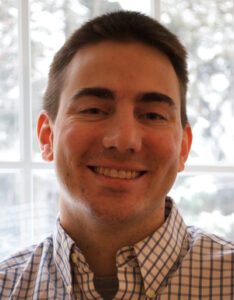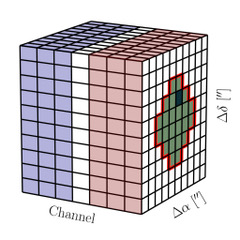From the early telescopes made hundreds of years ago by Galileo to the sophisticated astronomical observatories of today, people have built increasingly innovative tools to probe and measure the cosmos.
Soon, researchers at two new institutes funded by the U.S. National Science Foundation and the Simons Foundation will build a new breed of astronomical tools by harnessing the uniquely powerful abilities of artificial intelligence to assist and accelerate humanity’s understanding of the universe.
The new National Artificial Intelligence Research Institutes for astronomical sciences are part of the NSF-led National Artificial Intelligence Research Institutes program, which now includes 27 AI institutes across the U.S. The two new institutes will each receive $20 million over five years: $10 million from NSF and $10 million from the Simons Foundation.
University of Utah researchers will help lead one of these Institutes, known as the NSF-Simons AI Institute for Cosmic Origins (NSF-Simons CosmicAI).

“The massive amount of data that will be gathered in the coming years by the NSF-DOE Vera C. Rubin Observatory and other large-scale astronomical projects is simply too vast and rich to be fully explored with existing methods,” says NSF Director Sethuraman Panchanathan. “With reliable and trustworthy AI in their toolbox, everyone from students to senior researchers will have exciting new ways to gain valuable insights leading to amazing discoveries that might otherwise remain hidden in the data.”
Led by The University of Texas at Austin in collaboration with NSF NOIRLab, the NSF National Radio Astronomy Observatory, the University of Virginia and UCLA, NSF-Simons CosmicAI will develop next-generation AI tools to efficiently explore large astronomical datasets, investigate the nature of dark matter, and model pre-biotic molecules that are key to life in the Universe. The institute will also develop a powerful, new AI-based Astronomy “copilot” to accelerate the scientific method in astrophysics, helping researchers to more rapidly digest and analyze scientific literature and data, produce novel statistical analyses, and interpret these findings.
NSF-Simons CosmicAI is composed of four working groups, each addressing a fundamental challenge of processing massive datasets with AI: trustworthiness, efficiency, interpretability, and robustness.
Jeff Phillips, professor in Price Engineering’s Kahlert School of Computing, will serve as the AI lead on the efficiency working group. There, he and his colleagues will explore and expand techniques for analyzing the sort of “high-dimensional” data that radio astronomy produces.

One format this data comes in, for example, is known as an “interferometric spectral image cube.” Rather than two-dimensional arrays of pixels — images like the ones we’d see through an optical telescope — radio telescopes measure signals of magnetic flux across thousands of spectral channels. Each resulting data cube has information along three axes, producing “voxels” that can be analyzed from multiple perspectives.
“The spectroscopic axis of these cubes encodes molecular fingerprints critical for astrochemical analyses that are essential for foundational AI across astronomy”,” says Phillips. “But there are billions of voxels in a single dataset, and it is not trivial to figure out which ones are the most important using existing heuristics.”
Phillips, director of the Utah Center for Data Science, and his colleagues there will develop new ways of training AI systems to recognize salient features of these image cubes, greatly accelerating the preparatory steps that must be conducted before downstream scientific analysis can begin.
Other collaborators at the U include Penny Atkins, Research and Science Director of its Scientific Computing Institute, Ziad Al-Halal and El Kindi Rezig of the Kahlert School of Computing, and Joel Brownstein and Gail Zasowski of the College of Science’s Department of Physics And Astronomy.
The researchers will also be supported by the One Utah Data Science Hub, where Phillips and Atkins serve as academic leaders.
NSF-Simons CosmicAI and the NSF-Simons AI Institute for the Sky will seek to empower researchers at all career levels by providing access to trustworthy AI that can rapidly conceptualize and assist in research projects with full access to all published astronomical data and findings.
Training and education for early-career researchers and students is another objective the institutes will pursue over the next five years. The institutes will conduct a variety of outreach activities to broadly disseminate their innovations and help train the AI-literate workforce of tomorrow. Those activities include summer schools for high school students and teachers and the development of online courses allowing scientists and students anywhere in the U.S. to gain certification in the burgeoning field of AI- assisted astronomy.
Launched in 2019, the NSF-led AI Institutes program is part of a broad federal effort to advance a cohesive approach to AI-related opportunities and risks and supports the goals outlined in the White House’s 2023 “Executive Order on the Safe, Secure, and Trustworthy Development and Use of Artificial Intelligence.”
For more information about NSF’s decades-long support for foundational AI research and the AI Institutes program, visit NSF’s Artificial Intelligence webpage.
Penny Atkins also serves as Director, Research and Science, for the University of Utah’s One-U Responsible Artificial Intelligence Initiative (One-U RAI), which harnesses the transformative power of AI to benefit society. Launched in October 2023 by President Taylor Randall, the $100 million initiative supports interdisciplinary AI research with real-world impact in three areas where the U has deep expertise: the environment, health care and wellness, and teaching and learning. In addition to growing the U’s pool of AI researchers, the initiative will expand cyberinfrastructure and engage the broader community through partnerships and public events. One-U RAI is part of the Scientific Computing and Imaging (SCI) Institute, which is led by Manish Parashar and has a renowned history in collaborative, translational research.